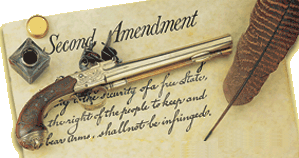 The hot breaking news today is that the Supreme Court has agreed to hear the case of McDonald v Chicago.
The hot breaking news today is that the Supreme Court has agreed to hear the case of McDonald v Chicago.
This is an incredibly important event because McDonald is the first Second Amendment incorporation case to be heard by the Supreme Court since the rise of the Incorporation Doctrine allowed the Court to begin selectively incorporating the protections embodied in the Bill of Rights against the states and offers the possibility of ending the draconian gun laws of states such as Illinois and New York forever!
“But wait” I hear you cry. “What do you mean by ‘incorporating against the states’? Aren’t the states already bound by the Bill of Rights?” I am so glad you asked. This is one of the least understood concepts in American constitutional law and this lack of understanding has lead to an incredible amount of frustration for gun rights activists over the years.
Although I cannot remember the specific case, I can remember vividly how upset I personally was when, about a decade ago, I was reading the transcript of an Illinois firearms possession case wherein a pro-se defendant was attempted to plead the Second Amendment as a defense only to be scolded by the judge that “The Second Amendment does not apply in this court.”
At the time, I was furious, certain that the judge was overstepping his bounds and applying a personal ideology to the case. Now, while I cannot dismiss the possibility of the latter, I can assure you that his statement was completely accurate! At this time, the Second Amendment offers you no protection whatsoever from state gun laws!
The entire concept of incorporation is based upon this shocking fact. The Bill of Rights, as amended to the original United States Constitution DOES NOT protect citizens from the actions of the states, ONLY the federal government. This was decided in the landmark 1833 case of Barron v. Baltimore and has never been overturned.
When the Fourteenth Amendment was ratified in 1868, it was widely felt that the Privileges or Immunities Clause in Section 1 of that Amendment would finally ‘incorporate’ the entire Bill of Rights against the states, forcing all states to use the Bill of Rights as a minimum standard for the civil rights protections they need grant their citizens.
However, in 1873, in the consolidated block appeal known as The Slaughter-House Cases, the Supreme Court held that the Privileges or Immunities Clause of the Fourteenth Amendment only protected rights granted by the federal government against state invasion and since the rights enumerated in the Bill of Rights were all fundamental rights that pre-existed the Constitution, they were not thus protected.
And it was against this backdrop that the Supreme Court heard the three cases most prominently quoted by gun-control advocates and Second Amendment deniers; Cruikshank, Presser, and Miller. Given little choice by precedent, the Court held in all three cases that the Second Amendment did not convey any protection against state laws.
And I should add that the same was held true for other enumerated rights during this time as well. But all of this began to change in the early 1900s. Inspired by the expansive and libertarian rulings that were the hallmark of the “Lochner Era”, the Court began to perceive that the Due Process Clause of the Fourteenth Amendment protected against both standard “procedural” due process as well as “substantive due process“. They further reasoned that rights which are “fundamental” cannot be infringed without denying to the aggrieved party some substantive due process element. And thus was born the Incorporation Doctrine. Starting with Gitlow in 1925, the Court slowly began to selectively incorporate the enumerated rights in the first eight amendments case by case.
Today, the Second Amendment remains one of the few enumerated rights to not enjoy incorporated status. But now, thanks to the brilliant legal strategy of lead counsel Alan Gura and the support of the Second Amendment Foundation, the Illinois State Rifle Association, and those brave defendants from Chicago, we may finally see the Second Amendment take its rightful place as a protection for ALL Americans!
